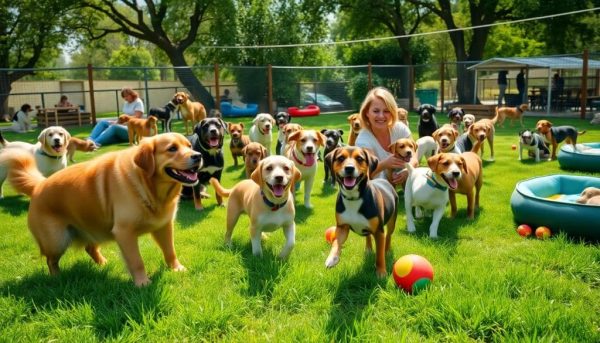Dog day care centers are increasingly becoming a vital resource for pet owners looking to enhance their dogs' social skills. These facilities provide a safe and engaging environment where dogs can interact with peers and humans, helping them develop crucial social abilities.
Through structured activities and supervision, dog day care can significantly contribute to a dog's overall well-being and adaptability. Understanding how dog day care helps with socialisation can provide pet owners with insights into the importance of these services.
Why is dog day care important for puppy development?
The early stages of a puppy's life are critical for their development, particularly when it comes to socialisation. Day care facilities offer a unique environment where puppies can interact with other dogs and people, which is essential for their growth.
At dog day care, puppies learn important life skills, such as how to engage in appropriate play and read canine body language. This is crucial as it sets the foundation for their behavior as adult dogs. Puppy pre-school programs often incorporate socialisation into their curriculum, ensuring that young dogs receive the necessary exposure to diverse environments.
Moreover, during these formative months, puppies are more adaptable, making it easier for them to learn from both positive and negative encounters. This early exposure can drastically reduce behavioral issues later in life, reinforcing the importance of early puppy socialisation.
How does dog day care enhance social skills in pups?
Dog day care facilities employ structured activities that promote interaction among dogs. These settings allow puppies to practice their social skills in a safe and controlled environment. By engaging in group activities, dogs learn to share toys, take turns, and understand the concept of personal space.
In addition, supervised playtime helps puppies learn from each other. They observe and mimic the behavior of other dogs, which is key to understanding canine communication. Positive reinforcement in dog training is often utilized in these settings to encourage good behavior during interactions.
- Puppies gain confidence through regular play sessions.
- Structured activities allow for the development of essential social skills.
- Supervision helps prevent negative interactions, ensuring a positive experience.
What are the key benefits of dog socialization?
Socializing dogs is not just about play; it encompasses a range of benefits that contribute to their overall mental and emotional health. One of the primary advantages is the reduction of anxiety. Dogs that engage with various other pets and humans are less likely to exhibit signs of separation anxiety.
Additionally, socialized dogs are often more adaptable to new environments, making them easier to manage in different situations. This adaptability can lead to a more harmonious living situation for both the dog and their owner.
Another significant advantage includes enhanced communication skills. A well-socialized dog can better understand body language and vocal cues from other dogs, leading to fewer misunderstandings and conflicts. This understanding is vital for creating a peaceful multi-dog household.
How can doggy day care reduce separation anxiety?
Dogs are social animals, and being left alone for long periods can lead to feelings of isolation and anxiety. Doggy day care provides a solution by offering a stimulating environment that occupies dogs' minds and bodies. This not only minimizes their feelings of loneliness but also helps them develop independence.
By attending day care regularly, dogs learn to associate being away from their owners with positive experiences. This shift in perception can lead to a significant decrease in separation anxiety, as dogs begin to anticipate the fun and social interactions awaiting them at day care.
Moreover, the mental stimulation and physical exercise they receive during the day aid in reducing stress levels. Dogs that are tired from play are less likely to engage in destructive behaviors at home due to boredom or anxiety.
What are the stages of dog socialization?
Dog socialization occurs in stages, each critical to the development of a well-adjusted pet. The first stage typically takes place between 3 to 14 weeks of age, where puppies are most receptive to new experiences and social interactions.
The second stage, known as the juvenile period, occurs between 3 to 6 months of age. During this time, young dogs should continue to be exposed to various environments, sounds, and people to reinforce positive behavior.
The final stage, adulthood, starts around the age of 1 year. While dogs can still learn and adapt, socialization becomes more challenging. Therefore, it is essential to start early and maintain consistent exposure throughout their lives.
How does London Dog Club support dog socialization?
The London Dog Club is renowned for its commitment to dog socialization and well-being. By offering a range of structured activities, they ensure that dogs of all ages can benefit from social interactions that enhance their skills.
The club organizes playgroups that cater to different sizes and temperaments of dogs, allowing for safe and positive interactions. This careful management helps reduce the risks of negative encounters, ensuring every dog enjoys their time at the facility.
In addition to organized play, the London Dog Club provides training sessions focused on canine body language and positive reinforcement techniques. This combination of play and training fosters a deep understanding of social cues among dogs, promoting healthier relationships.
What should you look for in a dog day care facility?
When selecting a dog day care facility, it is essential to consider several factors to ensure your pet's safety and happiness. First, check for proper licensing and accreditation, which can indicate a commitment to best practices in dog care.
Another critical aspect is the staff-to-dog ratio. A lower ratio means more individualized attention for each dog, which can lead to better socialization experiences. Additionally, inquire about the activities offered and whether they include structured play and training sessions.
- Look for a facility with a safe and clean environment.
- Ensure there are trained staff members supervising all interactions.
- Ask about the socialization programs and their structure.
- Check reviews and testimonials from other dog owners.
Choosing the right dog day care can make a significant difference in your pet's social skills, ensuring they grow into a well-adjusted and happy companion.
Related questions about dog socialization at day care
Is doggy daycare good for socialising?
Yes, doggy daycare is excellent for socializing. In these environments, dogs interact regularly with other dogs and humans, which helps them learn important social skills. The structured activities and supervised play allow dogs to develop confidence and adaptability, making it easier for them to engage positively with others throughout their lives.
How do dogs help people socialize?
Dogs serve as social catalysts, often helping people connect with one another. Walking a dog in a park or attending dog-related events creates opportunities for conversations and introductions among dog owners. This shared interest in pets fosters community and encourages interaction, making it easier for individuals to meet new friends.
What are the benefits of doggie daycare?
Doggie daycare offers numerous advantages, including providing mental stimulation and exercise, reducing separation anxiety, and enhancing social skills. Dogs that attend daycare tend to be happier and more well-adjusted, as they engage in regular play and learn how to interact appropriately with both humans and other dogs.
How to help a dog with socialization?
Helping a dog with socialization involves gradual exposure to various environments, people, and other pets. Start by introducing your dog to a controlled setting, such as a dog park or a dog day care facility. Positive reinforcement, such as treats and praise for good behavior, can create a favorable association with social interactions. Consistency and patience are key to ensuring your dog becomes a well-socialized adult.





Leave a Reply